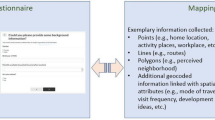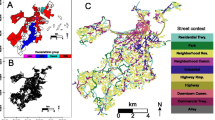Abstract
Today, the urban computing scenario is emerging as a concept where humans can be used as a component to probe city dynamics. The urban activities can be described by the close integration of ICT devices and humans. In the quest for creating sustainable livable cities, the deep understanding of urban mobility and space syntax is of crucial importance. This research aims to explore and demonstrate the vast potential of using large-scale mobile-phone GPS data for analysis of human activity and urban connectivity. A new type of mobile sensing data called “Auto-GPS” has been anonymously collected from 1.5 million people for a period of over one year in Japan. The analysis delivers some insights on interim evolution of population density, urban connectivity and commuting choice. The results enable urban planners to better understand the urban organism with more complete inclusion of urban activities and their evolution through space and time.
Access this chapter
Tax calculation will be finalised at checkout
Purchases are for personal use only
Preview
Unable to display preview. Download preview PDF.
Similar content being viewed by others
References
González, M.C., Hidalgo, C.A., Barabási, A.-L.: Understanding individual human mobility patterns. Nature 458, 238 (2009)
Song, C., Qu, Z., Blumm, N., Barabási, A.-L.: Limits of predictability in human mobility. Science 327(5968), 1018–1021 (2010)
Isaacman, S., Becker, R., Cáceres, R., Kobourov, S., Rowland, J., Varshavsky, A.: A tale of two cities. In: Proceedings of the Eleventh Workshop on Mobile Computing Systems & Applications (2010)
de Jong, R., Mensonides, W.: Wearable GPS device as a data collection method for travel research. In: ITS-WP-03-02, Institute of Transport Studies, University of Sydney (2003)
Li, Z., Wang, J., Han, J.: Mining event periodicity from incomplete observations. In: Proceedings of the 18th ACM SIGKDD International Conference on Knowledge Discovery and Data Mining (2012)
Ashbrook, D., Starner, T.: Using GPS to learn significant locations and predict movement across multiple users. Personal and Ubiquitous Computing 7, 275–286 (2003)
Gong, H., Chen, C., Bialostozky, E., Lawson, C.: A GPS/GIS method for travel mode detection in New York City. Computers, Environment and Urban Systems (2011)
Fontana, D., Zambonelli, F.: Towards an infrastructure for urban superorganisms: challenges and architecture. In: IEEE International Conference on Cyber, Physical and Social Computing (2012)
Horanont, T., Witayangkurn, A., Sekimoto, Y., Shibasaki, R.: Large-Scale Auto-GPS Analysis for Discerning Behavior Change during Crisis. IEEE Intelligent Systems 28(4), 26–34 (2013)
Horanont, T., Phithakkitnukoon, S., Leong, T.W., Sekimoto, Y., Shibasaki, R.: Weather Effects on the Patterns of People’s Everyday Activities: A Study Using GPS Traces of Mobile Phone Users. PLoS ONE 8(12), e81153 (2013)
National-Land Information Office. http://www.mlit.go.jp/kokudoseisaku/gis/index.html (Retrieved January 27, 2013)
Zheng, Y., Li, Q., Chen, Y., Xie, X., Ma, W.-Y.: Understanding mobility based on GPS data. In: Proceedings of the 10th ACM International Conference on Ubiquitous Computing (UbiComp 2008), New York, NY, USA, pp. 312–321 (2008)
Author information
Authors and Affiliations
Corresponding authors
Editor information
Editors and Affiliations
Rights and permissions
Copyright information
© 2015 Institute for Computer Sciences, Social Informatics and Telecommunications Engineering
About this paper
Cite this paper
Horanont, T., Phithakkitnukoon, S., Shibasaki, R. (2015). Sensing Urban Density Using Mobile Phone GPS Locations: A Case Study of Odaiba Area, Japan. In: Vinh, P., Vassev, E., Hinchey, M. (eds) Nature of Computation and Communication. ICTCC 2014. Lecture Notes of the Institute for Computer Sciences, Social Informatics and Telecommunications Engineering, vol 144. Springer, Cham. https://doi.org/10.1007/978-3-319-15392-6_15
Download citation
DOI: https://doi.org/10.1007/978-3-319-15392-6_15
Published:
Publisher Name: Springer, Cham
Print ISBN: 978-3-319-15391-9
Online ISBN: 978-3-319-15392-6
eBook Packages: Computer ScienceComputer Science (R0)




